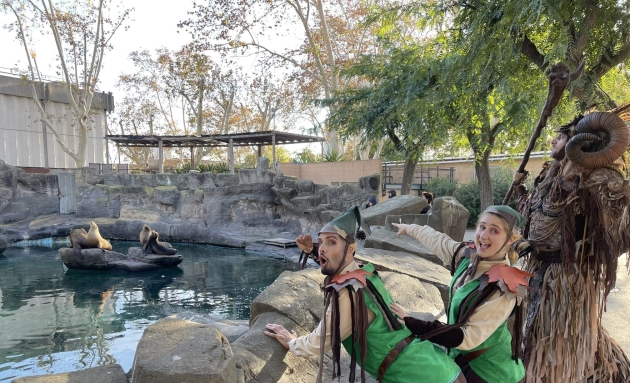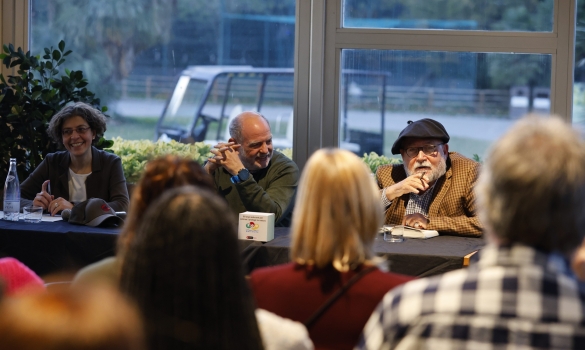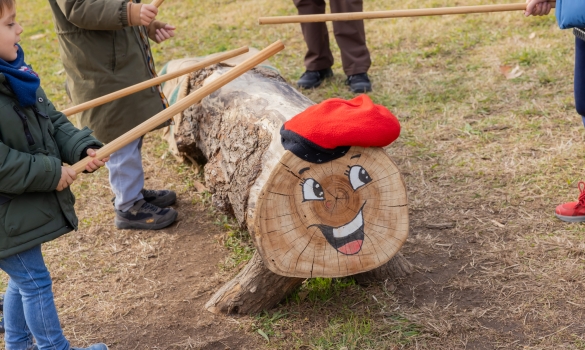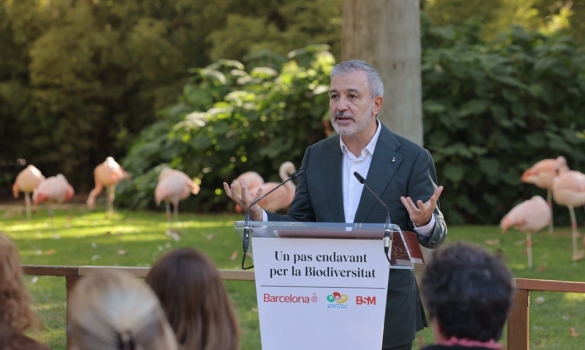

The number of visitors rose 10% compared to 2022
The Zoo launched a new educational plan to foster understanding of biodiversity and cemented the success of family activities such as the Nature Passport
It also continued projects to reintroduce various native species, including the Mediterranean pond turtle, the Montseny brook newt and the European polecat, into nature
The Barcelona Zoo closed out 2023 with a new record number of visitors. A total of 818,288 people visited the park in the past 12 months, the highest figure in the past six years. The records show 10% growth compared to the number of people who came to the Zoo in 2022 and a large increase compared to the 710,000 visits in 2019, prior to the pandemic. This confirms the upward trend in the number of people coming to the Zoo since the launch of the New Zoo Model.
The response from families has continued to be positive. By the end of 2023, 23,367 households (78,016 individuals) were members of the Zoo Club. These figures stabilise the growth seen since 2021, and the total number of members is 60% above pre-pandemic figures.
One of the Zoo’s latest features is the Invertebrates area, which opened in the summer of 2022 and attracted more than 200,000 visitors this past year. New activities, such as the dramatised show “The Zoo Elves” have also been hits with audiences. A total of 31,300 people participated in the open, free activities at the Zoo throughout the year.
The Zoo School also continued to grow in 2023. The attendance figures at the activities for children and schools have risen 3%. A total of 19,000 children participated in experiences such as summer camps at the Zoo, school visits and workshops, and birthdays. This includes the 632 adolescents in the first and second years of compulsory secondary education (ESO) in Barcelona and its metropolitan area who participated in the second edition of STEAM Zoo, a project organised together with BSM and the Polytechnic University of Catalonia – BarcelonaTech with the goal of promoting careers in science.
Finally, the Nature Passport, created in the summer of 2022 to encourage understanding of the planet’s biodiversity among children in the Zoo Club, has also cemented its popularity. A total of 6,761 people had fun with this programme in 2023.
“2023 was very positive for the Zoo in terms of both projects and visitors,” says Laia Bonet, First Deputy Mayor and president of the Barcelona Zoo Foundation. “The growth it has seen in recent years is thanks to its significant community outreach work to build relationships with visitors and keep them coming back. The widespread popularity of its activities, especially for families, attest to this.”
A new educational plan for primary and secondary schools
As part of Barcelona Zoo’s process of becoming a leading centre for conserving biodiversity and promoting respect for nature and the environment, it has launched a new series of educational activities targeted at primary and secondary schools. The programming, which got underway in academic year 2023-2024, includes seven participatory, experiential activities that chiefly seek to reconnect students with nature and influence their habits.
This new educational package has come with the launch of new educational spaces, specifically a new multipurpose room, a laboratory and two classrooms. Ludo Zoo, a place where families visiting the Zoo can discover the planet’s biodiversity through books, games and other materials, also opened in 2023, and has been highly popular.
Research and conservation, key themes at the new Zoo
The Zoo’s commitment to preserving endangered species extends beyond its walls. In 2023, it contributed to around 30 projects for the conservation of endangered specimens and habitats, through its participation in various projects, including the European Association of Zoos and Aquaria’s (EAZA) Endangered Species Programme. Furthermore, the Barcelona Zoo Foundation has awarded eight grants to young researchers to conduct projects focused primarily on studying native Mediterranean fauna and ecosystems. A total of 71,219 euros is earmarked for these projects.
One highlight of these conservation efforts has been the birth of two blue-throated macaws (Ara glaucogularis) at the Barcelona Zoo for the first time. This species, originally from Bolivia, is listed by the International Union for Conservation of Nature (IUCN) as critically endangered. Another highlight has been the birth of a Eurasian griffon vulture (Gyps fulvus), a local bird that is also endangered and that the Barcelona Zoo has been working to save for many years.
In parallel, projects to reintroduce different native species into nature have continued. These species include the Mediterranean pond turtle (Mauremys leprosa), the Hermann’s turtle (Testudo hermanni), the Montseny brook newt (Calotriton arnoldi), the Spanish toothcarp (Aphanius Iberus), the Majorcan midwife toad (Alytes muletensis), the European polecat (Mustela putorius) and the hermit ibis (Geronticus eremita).
In 2023, the Barcelona Zoo Foundation and Borneo Nature Foundation strengthened their partnership to conserve the natural habitat of orangutans in Borneo, Indonesia. The Zoo also served as a veterinary advisor at the international conference, held in Indonesia, on caring for and maintaining Komodo dragons.
As for animal welfare, the Zoo continues to constantly improve its facilities and care for the animals it houses, work it carries out in collaboration with the Universitat Autònoma de Barcelona.



